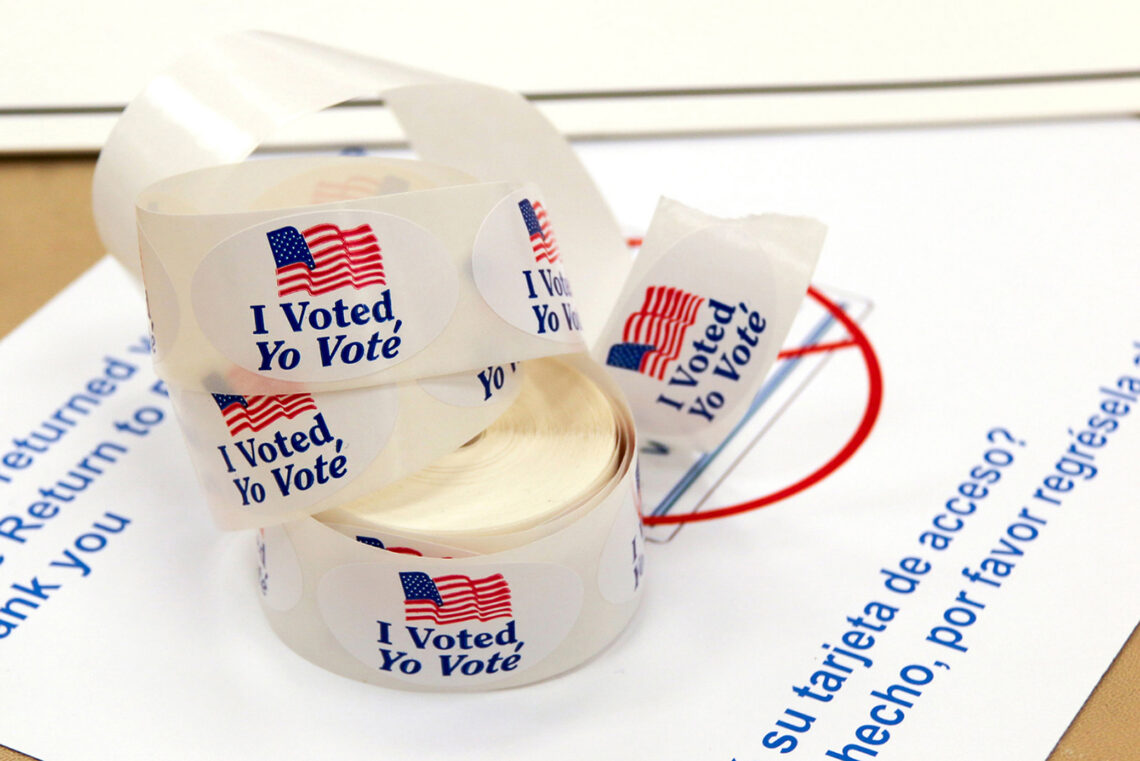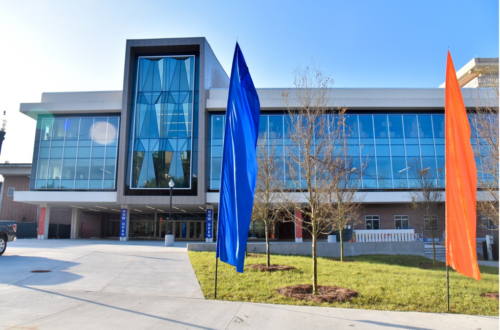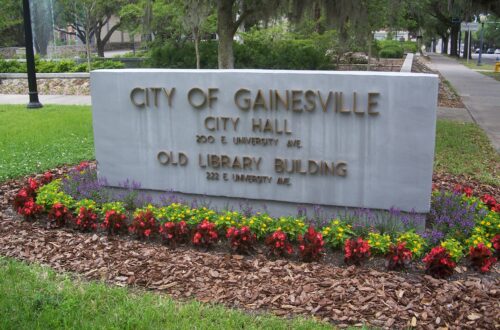Early voting has started in the state of Florida. On the University of Florida campus, our team decided to ask students around the Plaza of the Americas their thoughts on the 2024 election cycle. Sofia Zarran and Andrea Hidalgo host this episode of Florida Politics, Reviewed on the topic of student voters.
The average listening time for this episode is 14:30 minutes.
Read below for the full transcript.
Krista Jensen: Are you busy right now? Or would you be comfortable if I asked you a couple of questions about the upcoming election for a podcast?
Student: Uh, no I’m not that informed about it.
Krista: No worries. Sorry to interrupt. Have a good day.
Z: Yeah, we discovered that it’s not easy to just like, figure out, “Oh yeah, that person’s a Democrat, that person’s a Republican, this person’s not registered to vote.”
But we’re, we’re gonna get into that. So, yes. You are listening to the Florida Political Review. This is our first episode of 2024 at the very least. So yeah, we decided to go up to random students on campus and ask them what their political views were. More specifically, we decided to ask them about the presidential election.
I’m Sofia Zarran, you can call me Z.
Andrea Hidalgo: And I’m Andrea Gomez Hidalgo. The name’s very Hispanic, and you can call me Andy if you want, whatever floats your boat.
Z: We are your hosts for the first episode of this FPR podcast. We are here in Gainesville at the University of Florida. We are a UF Bob Graham Center club.
Early voting for the 2024 general elections. So early voting in Alachua County actually starts today, at the time that I’m recording this, October 21st, and voter registration ended October 7th. And yeah, so we were just curious, you know, as fellow college students, how many college students vote, who are they voting for, why are they voting, why aren’t they voting. And yeah.
Andrea: So like Z mentioned, we are here at UF, so naturally we are going to go and talk to our fellow students. Well actually, it turns out that 88 percent of students who are eligible to vote were registered to vote in 2020, so the last presidential election.
Z: That is UF students who were eligible to vote were registered. The survey was conducted by the Bob Graham Center in their 2022 action plan to increase civic learning, political engagement, and voter participation here at the University of Florida.
Andrea: So then the UF student voting rate was actually 76.7 percent in the 2020 election, according to the same survey. And then according to a later survey by Tufts University in 2022, the national student voting rate was actually 31.3 percent. And that’s almost 10 points down from the last election, but you have students are very far ahead in that way. So keep up that up. Number six uni, public university energy and bring it to the polls, guys.
Z: Okay, so just for those of you that are curious, it depends on where you’re looking how UF is ranked. So according to U. S. News and World Report, we are ranked number seven in public universities. According to Forbes, we’re ranked number 26. So that explains our ranking just a little bit. UF is pretty far ahead in voting rates and voter participation for students. That was from the last election, which was…
Andrea: The presidential one?
Z: Yeah, that was Trump and Biden.
Andrea: Yeah, that was 2020.
Z: Yeah, that was Trump and Biden. And then the year before that it was even lower for Trump and Hillary.
Andrea: He’s run like this is his third time.
Z: This is his third time. So the first time he ran was Clinton.
Andrea: Yeah, that was 2016.
Z: And then it was Biden and then it was going to be Biden again, but then he dropped out and now it’s Kamala.
Andrea: That man needed rest. Like he needed to rest.
Z: He’s busy. He’s got things. He’s doing things. He’s doing things.
Andrea: His little ice cream
Z: I don’t know what that is.
Andrea: You don’t?
Z: Okay, wait, no, what is the ice cream?
Andrea: It’s just like a meme because he always loves ice cream. Like, he always goes out and gets ice cream.
Z: I did not know this.
Andrea: Yeah.
Z: That’s crazy, but okay. Yeah, and he’s also, he’s actually registered, he’s a Florida voter. Oh. I forget that sometimes.
Z: It’s at this point in editing that I realize Andrea was talking about Biden and I was talking about Trump. Trump is a Florida voter. Not Biden.
Z: Another tangent that Andrea and I went on. So, Andrea is a poli sci major and I am a journalism major and that’s why we were together in a booth talking about this and up in Plaza [of the Americas] asking a bunch of random people their political opinions.
Other than talking about this amongst ourselves, we did actually go up to people. And just in case you didn’t know, by Plaza, we did mean Plaza of the Americas at the University of Florida. Very awkwardly, you could hear our friend and fellow producer, Krista Jensen being rejected in the beginning of the episode.
So the first person we’re going to hear from is Matthew Hinds. He is a sophomore history and political science major from Boynton Beach, Florida.
Matthew Hinds: I am registered to vote. Have you voted before? I voted in the primaries, the democratic primaries that were a couple months ago, but I haven’t voted in a general election before.
Z: So how do you think that this presidential election cycle has gone so far?
Matthew Hinds: Well, I think that it’s pretty polarizing. I think the country is very divided on what direction we want to go in. Uh, but personally I’m supporting Kamala Harris because I think that she, is the person who can bring America forward and hopefully we can sort of work through the division because I think that Donald Trump and his rhetoric is very harmful to, to our nation.
Z: I then asked Matthew what his experience as a student voter had been like so far. He talked about trying to get students to vote and the impact he thinks it can have on elections.
Matthew Hinds: Sometimes people overlook just local candidates. I think that’s really important. And I think when students are involved, With local politics, it can be helpful, so.
Z: And how do you think that universities, but also UF specifically, has done with, like, creating an environment for students to become politically involved and active?
Matthew Hinds: I feel very comfortable being out every day expressing my, my political views, whether that’s when I’m tabling at Plaza de Americas or, you know, in a, I’m, like I said, a poli sci major, so I’m in a lot of political classes and I’m not afraid to. I feel comfortable to voice my opinions. So I think that UF has created a pretty safe environment for that.
Z: That was Matthew Hinds. He, again, is a sophomore poli sci major. You’re a poli sci major.
Andrea: I am a poli sci major.
Z: What year are you?
Andrea: I’m a sophomore.
Z: Oh my god. Yeah. Did you recognize him at all?
Andrea: No. I don’t know how big that major is. It’s actually pretty big, because like you have very different like, like little niches in the major, if that makes sense.
Z: But yes, so Matthew, Mr. Hinds, he is one of those student voters that it seems UF has a lot of compared to the rest of the nation. You know, we’re not going to speculate about that here, but you can do that speculating on your own as to why you think UF specifically might have more student voters. It was a little bit more difficult though to find those that were not part of that 88 percent that was registered and the 76 voter percent rate.
Andrea: That’s where us trying to clock people at the Plaza was not working out.
Z: Yeah, because it turns out, um, not voting makes you a minority here on campus. The majority is a registered voter. Yeah.
Andrea: Yeah.
Z: So thankfully before we were going out to do this, my coworker overheard me talking about this episode and that we were going to be interviewing people about their thoughts on this presidential election. And he seemed very eager to talk. And then when we went out and we couldn’t really find anybody, I was like, “Yeah, why not?” And he was like, “Yay!” and he held off on his lunch and everything.
So this is Andrew Sheridan. He is a fourth-year journalism student at the University of Florida.
Andrew Sheridan: I am not currently registered to vote right now.
Z: Do you plan on registering?
Andrew Sheridan: I have planned on registering for a while. I’ve talked to my dad about it. But as we keep getting closer and my schedule just, right now I’m not sure 100%, probably leaning not towards registering right now. I had planned on voting for a long time, but yeah, this election, I am pretty confident in who I would vote for to win our state specifically. So I’m not too urged to go and register to vote.
Z: Do you want to say like who you would want to win?
Andrew Sheridan: I, preferably not. I think being able to talk about it. I mean, when the debates are going on, you see a lot of people watching it here. A lot of people talking about it. Restaurants will have it on, but I think it’s definitely, I miss the days where it’s like you ask your mom who they vote for and you don’t like you don’t talk about it at all.
Now it’s definitely more talked about in universities. I feel like you definitely see teachers maybe talk about a little too much with how the position they hold being a little more in power than us students, but I feel like some people are still scared to kind of go out and actually talk about who they support and rather they would just do it by voting.
Andrea: So Andrew says he gets a lot of his political content on his social media, which can be scary because it filters in a lot of bias, but it is an effective way to follow politics. He also said he will talk about certain issues with his family and friends.
Andrew Sheridan: So this is the first election I’ve actually been able to register and actually vote, so it’s, I only know it so far as a student, but compared to other people, it’s like, I think it’s easier to get a person who’s working a 9 to 5 to go vote, in my opinion. Because they can stop by their polling station on the way to work or on the way home from work where it’s like if you’re a student and you got class for one hour on campus, are you really going to go back to campus to vote or the other side of campus to vote where, and it’s just like if you don’t have class that day or you’re online, are you really going to leave your house to go vote?
That’s, I don’t know if a lot of students just care enough to do that.
Z: Yes. Well, that was Andrew Sheridan. He is a fourth-year journalism student and his specialization is in radio. So is mine. Andrew did give us that voice of students who are not registered to vote. They are the minority on this campus, not being registered to vote as a student.
We did, however, not hear from any Republican students. There are, however, Republican students. At the University of Florida, there is a-
Andrea: Yes so UF does have a UF College Democrats as well as a UF College Republicans.
Z: Just by the time for this episode, we weren’t able to find them out and about because that was the point.
We were just kind of randomly talking to people and we weren’t able to find anybody. But yeah, we did mainly hear from Democratic students as we went around, which probably adds up a little bit because the majority of youth voters are Democrats.
Andrea: Mm-hmm. Lastly, we will hear from Arsema Denber. She is a sophomore majoring in psychology and she was born in Ethiopia and is a registered voter.
And, this is her first time voting.
Arsema Denber: Trump, he has already served. So I think we’ve already experienced him as a president and all of the issues that came with that, that comes with his rhetoric and the things that he not only like supports, but like, I think he really exploits. You know, white supremacy and anti-immigrant, like, ideas to his benefit.
So I would say that’s the type of candidate he is to me. And Kamala Harris, I think that her party and the things that they’ve talked about has mainly just been trying to appeal to the working class. We’re going to try to get more jobs. I’ve seen a lot of things about them saying they are like, her ideas are to create more jobs for people after with four-year degrees and things like that.
So I would say appealing to the working class more and to women as well. So those are the two positioning views that I have right now.
Andrea: I then asked her what she thought about this election and what was her incentive to vote.
Arsema Denber: Uh, I do feel an incentive to vote, especially because of, like, the two candidates that we are looking at.
I do think, like, it’s kind of crazy and it’s kind of scary, like, just from my personal opinion that it’s even a possibility that Trump is a candidate.
Andrea: One of the last questions we asked her is what it’s been like, not just as a student voting, but an immigrant voting for the first time.
Arsema Denber: I think for immigrants it’s really scary to see so much support, um, for a candidate like him because it just, you know, it just continues to make us feel like outsiders and like unwelcome in a place that we pay taxes, live, live our lives. Contribute to society. It still is like, oh, we are welcome in and we’re doing everything we need to do. People that are doing everything they need to do correctly, but they still feel like they’re just not welcome.
Z: Again, that was Arsema Denver, a sophomore psychology major here at the University of Florida.
So the youth vote in 2020 was majority Democratic. By the time we sat down to record this episode, we were not able to find data about how UF students were registered if they were Democratic or Republican. However, the youth vote in 2020 was majority Democratic at 63%. So that might say a little bit and if we did this over a longer period of time I’m sure they’re out there.
There are Republican students at the University of Florida just as there are Democratic students but we did hear mainly from Democratic students as we went around and just like picked people out from the crowd.
Andrea: We definitely do need to expand our boundaries though. I feel like the Plaza was very– we just went around Plaza and just like, we’re picking people out.
Z: And that’s what we were saying in the beginning that it was kind of hard to just find people cause like we don’t want to go up to like hundreds of people and every single one of them be a Democrat. And it was really hot out.
Andrea: It was so hot. I don’t want to talk about that. That was like the worst part.
Z: Yes, so these just happened to be the people who agreed to speak with us.
Andrea: So we at the FPR and the Bob Graham Center are nonpartisan, okay?
We do love to hear from students though. It’s really fun for us to go up to them talk to them meet new people and we love to hear political opinions and views but in respectful ways, of course, so if you have any ideas for topics that we like for us to cover reach out to us on our socials.
We are @floridapoliticalreview on Instagram and you can find our website online too at www.floridapoliticalreview.com.
Oh, I’ve always wanted to say that.
Z: Yeah, that is basically all we have for you guys. Thank you so much for listening. We will, most likely, most definitely, have more updates on this 2024 election season, the cycle, soon. I’m Z.
Andrea: And I am Andrea Hidalgo.
Z: And you’re listening to the Florida Political Review. We review politics in Florida. Stay tuned and stay informed.
Check out other recent articles from the Florida Political Review here.





